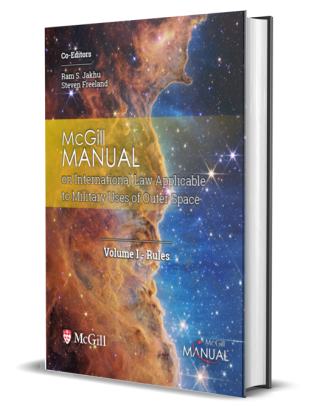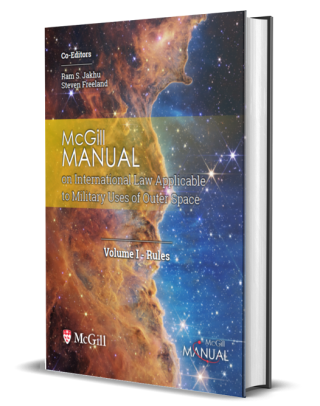
Montreal, 28 July 2022
After over six years of intense collaboration with subject-matter experts and institutions from across the globe, McGill University is pleased to announce the publication of Volume I of the McGill Manual on International Law Applicable to Military Uses of Outer Space (McGill Manual: Volume I - Rules).
Space infrastructures have been bringing great socio-economic, technological and scientific benefits to humanity for over six decades. Unfortunately, our growing dependence on these space assets and applications has been accompanied by increasing threats to their infrastructures. States as well as public and private space operators are increasingly alarmed by the possibility of geopolitical tensions leading to rapid development and deployment of space weapons that would result in an extension of armed conflict in outer space. The human costs and devastating consequences of the disruption or destruction of satellites that facilitate, among other things, telecommunications, global navigation and positioning, and weather forecasting, cannot be imagined.
“By clarifying the law as it applies to outer space, this innovative and international collaborative research on a very complex subject is not only of practical value to States but will also be of value to space operators”, said McGill Manual Co-Editor Professor Ram S. Jakhu. “Moreover, it sets the agenda for further research on legal issues related to current and emerging challenges in the peaceful exploration and use of outer space”.
The McGill Manual is the product of the MILAMOS Project spearheaded by McGill Faculty of Law’s Centre for Research in Air and Space Law. Its rules result from the impartial and rigorous efforts of an independent group of more than 80 highly qualified legal and technical experts from various countries, with both civilian and military backgrounds. Co-edited by McGill Faculty of Law Professor Ram S. Jakhu and Emeritus Professor Steven Freeland of Western Sydney University, Australia, the McGill Manual is the world’s first manual clarifying international law applicable to military uses of outer space.
Inspired by the vision of contributing to a future where all space activities are conducted in accordance with the international rules-based order for the benefit of present and future generations, the fifty-two Rules of the McGill Manual adopted by consensus by the group of experts cover a variety of international law topics that are of critical importance to all space activities conducted during peacetime and in time of tension that pose challenges to peace. This globally-recognised initiative received funding from Government of Canada’s Social Sciences and Humanities Research Council, the Erin J. C. Arsenault Fund at McGill University, and other sources, as well as support from various stakeholders and academic institutions worldwide.
Over the past few years, dozens of in-person meetings were held in, among other locations, Australia, Canada, China, Germany, India, Japan, and the United States. These provided opportunities for the group of experts involved to exchange views and reach consensus on rules of international law as it stands in relation to the rapid proliferation of activities in outer space. Further, such meetings provided interested stakeholders and government representatives an avenue to observe and provide input to the rule-drafting and consensus-forming process.
In recognition of the McGill Manual’s timeliness and relevance, experts involved have been invited to present preliminary findings before such important fora as the United Nations. Most recently, the McGill Manual was highlighted at the Open-Ended Working Group on Reducing Space Threats as part of multilateral discussions to remind the international community of the continued relevance of international law in safeguarding international peace and security in outer space, and on Earth.
The publication of the Rules of the McGill Manual today marks a major milestone in supporting ongoing international efforts to strengthen the international rule-based order for the safe, secure, peaceful, and sustainable use of outer space.
Through a dedicated website, we invite members of the public to share their relevant comments, perspectives and views, particularly on the practice of States, relating to the 52 Rules of the McGill Manual. These comments will be duly considered for inclusion in the Commentaries on the Rules that are being worked on. This process of public consultation will be of added value to the McGill Manual: Volume II - Rules with Commentaries, which is being published separately.
For more information, please contact the kuan-wei.chen [at] mcgill.ca (subject: McGill%20Manual) (McGill Manual Managing Editor Kuan-Wei Chen) or visit www.mcgill.ca/milamos

Parution du Manuel de McGill, le premier manuel au monde clarifiant le droit international applicable aux utilisations militaires de l’espace extra-atmosphérique

Montréal, 28 juillet 2022
Après plus de six années de collaboration intensive entre des experts et des institutions du monde entier, l’Université McGill est ravie d’annoncer la parution du volume I du McGill Manual on International Law Applicable to Military Uses of Outer Space (Manuel de McGill, volume I : Règles).
Depuis plus de six décennies, les infrastructures spatiales offrent à l’humanité de grands avantages socio-économiques, technologiques et scientifiques ; notre dépendance grandissante à ces applications et objets spatiaux s’accompagne malheureusement d’une menace croissante à leur endroit. Les États, de même que les opérateurs spatiaux publics et privés, s’inquiètent que des tensions géopolitiques mènent à la conception et au déploiement rapides d’armes spatiales qui pourraient entraîner l’extension dans l’espace de conflits armés. La perturbation ou la destruction de satellites — qui permettent notamment les télécommunications, la navigation et le positionnement global ainsi que les prévisions météorologiques — entraînerait des coûts humains et des conséquences d’une ampleur inimaginable.
« En clarifiant le droit applicable à l’espace extra-atmosphérique, cet ouvrage de recherche innovant, résultat d’une coopération internationale sur un sujet très complexe, a non seulement une valeur pratique pour les États, mais sera aussi utile pour les opérateurs spatiaux », a déclaré le professeur Ram S. Jakhu, co-directeur du Manuel de McGill. « De plus, il suggère des pistes de recherche ultérieure sur les enjeux juridiques découlant des défis actuels et émergents en lien avec l’exploration et l’exploitation pacifiques de l’espace ».
Le Manuel de McGill est le fruit du projet MILAMOS piloté par le Centre de recherche en droit aérien et spatial de la Faculté de droit de McGill. Ses règles ont été définies grâce aux efforts impartiaux et rigoureux d’un groupe indépendant de plus de 80 experts juridiques et techniques hautement qualifiés, civils et militaires. Co-dirigé par le professeur Ram S. Jakhu de la Faculté de droit de l’Université McGill et le professeur émérite Steven Freeland de l’Université Western Sydney en Australie, le Manuel de McGill est le premier manuel au monde clarifiant le droit international applicable aux utilisations militaires de l’espace extra-atmosphérique.
Inspirées par la vision de contribuer à un avenir où toutes les activités spatiales seraient menées conformément aux règles fondant l’ordre international et au bénéfice des générations actuelles et futures, les cinquante-deux règles du Manuel de McGill adoptées par consensus par le groupe d’experts couvrent une variété de sujets de droit international qui sont d’une importance critique pour toutes les activités spatiales menées en temps de paix et en période de tensions. Cette initiative, reconnue mondialement, a entre autres bénéficié du financement du Conseil de recherches en sciences humaines du Gouvernement du Canada et du Fonds Erin JC Arsenault de l’Université McGill, ainsi que du soutien de diverses parties prenantes et d’institutions universitaires du monde entier.
Au cours des dernières années, des dizaines de réunions en personne se sont tenues, entre autres, en Australie, au Canada, en Chine, en Allemagne, en Inde, au Japon et aux États-Unis. Ces rencontres ont permis au groupe d’experts impliqués d’échanger leurs points de vue et de parvenir à un consensus sur les règles du droit international applicables à la prolifération rapide des activités dans l’espace. De plus, ces réunions ont permis aux parties intéressées et aux représentants gouvernementaux d’observer et de commenter le processus de rédaction de règles et de recherche de consensus. Reconnaissant l’opportunité du Manuel de McGill, des forums de prestige tels que l’Organisation des Nations Unies ont invité certains de ses experts à présenter leurs conclusions préliminaires. Récemment, le Manuel de McGill a été présenté au Open-ended working group on reducing space threats dans le cadre de discussions multilatérales visant à rappeler à la communauté internationale la pertinence continue du droit international pour protéger la paix internationale et la sécurité, dans l’espace comme sur Terre.
La publication des règles du Manuel de McGill marque aujourd’hui un pas important vers la préservation de l’utilisation sûre, pacifique et durable de l’espace grâce au soutien qu’elle apporte aux efforts mondiaux pour renforcer les règles fondant l’ordre international. Un deuxième volume du Manuel de McGill contenant les règles commentées paraîtra à une date ultérieure cette année.
Par l’entremise d’un site web dédié, nous invitons les membres du public à partager leurs commentaires, leur point de vue et leurs opinions sur le manuel, en particulier sur les pratiques d’États relatives aux 52 règles du Manuel de McGill. Ces commentaires seront dûment pris en considération pour une éventuelle inclusion dans les règles commentées, qui sont en cours d’élaboration. Ce processus de consultation publique apportera une valeur ajoutée au McGill Manual: Volume II - Rules with Commentaries, qui sera publié séparément.
Pour obtenir plus de renseignements, veuillez communiquer avec directeur de la redaction Kuan-Wei Chen, ou consulter le site web www.mcgill.ca/milamos.